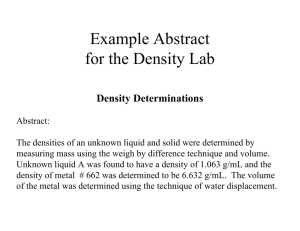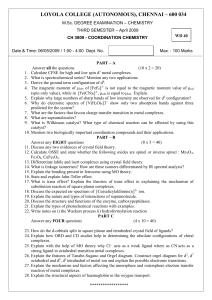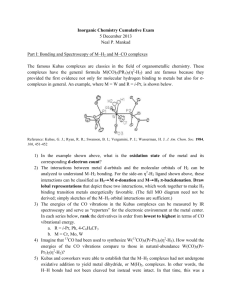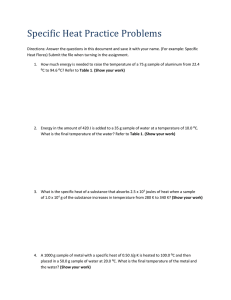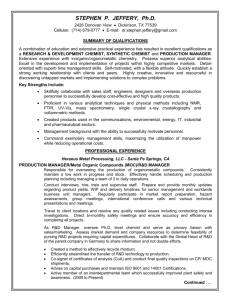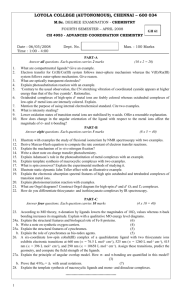CHEM-GA 2262 The Chemistry of the Transition Metals
advertisement
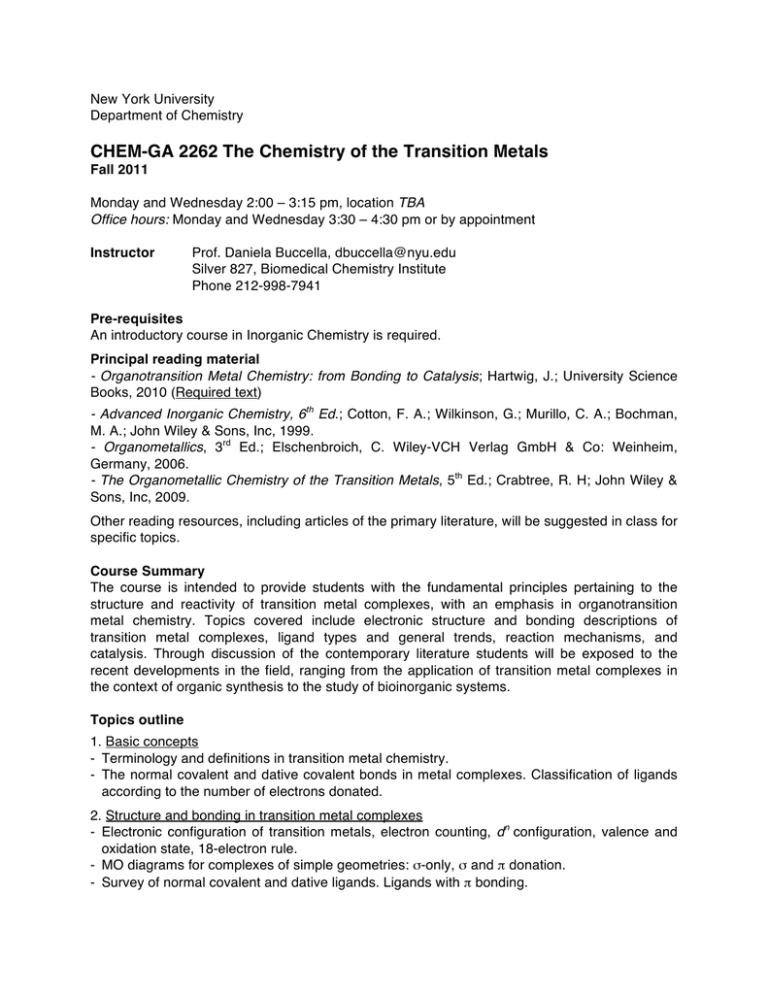
New York University Department of Chemistry CHEM-GA 2262 The Chemistry of the Transition Metals Fall 2011 Monday and Wednesday 2:00 – 3:15 pm, location TBA Office hours: Monday and Wednesday 3:30 – 4:30 pm or by appointment Instructor Prof. Daniela Buccella, dbuccella@nyu.edu Silver 827, Biomedical Chemistry Institute Phone 212-998-7941 Pre-requisites An introductory course in Inorganic Chemistry is required. Principal reading material - Organotransition Metal Chemistry: from Bonding to Catalysis; Hartwig, J.; University Science Books, 2010 (Required text) - Advanced Inorganic Chemistry, 6th Ed.; Cotton, F. A.; Wilkinson, G.; Murillo, C. A.; Bochman, M. A.; John Wiley & Sons, Inc, 1999. - Organometallics, 3rd Ed.; Elschenbroich, C. Wiley-VCH Verlag GmbH & Co: Weinheim, Germany, 2006. - The Organometallic Chemistry of the Transition Metals, 5th Ed.; Crabtree, R. H; John Wiley & Sons, Inc, 2009. Other reading resources, including articles of the primary literature, will be suggested in class for specific topics. Course Summary The course is intended to provide students with the fundamental principles pertaining to the structure and reactivity of transition metal complexes, with an emphasis in organotransition metal chemistry. Topics covered include electronic structure and bonding descriptions of transition metal complexes, ligand types and general trends, reaction mechanisms, and catalysis. Through discussion of the contemporary literature students will be exposed to the recent developments in the field, ranging from the application of transition metal complexes in the context of organic synthesis to the study of bioinorganic systems. Topics outline 1. Basic concepts - Terminology and definitions in transition metal chemistry. - The normal covalent and dative covalent bonds in metal complexes. Classification of ligands according to the number of electrons donated. 2. Structure and bonding in transition metal complexes - Electronic configuration of transition metals, electron counting, dn configuration, valence and oxidation state, 18-electron rule. - MO diagrams for complexes of simple geometries: σ-only, σ and π donation. - Survey of normal covalent and dative ligands. Ligands with π bonding. - Trends in the properties of transition metal complexes. - Physical methods employed to study transition metal complexes and their reactions. 3. Reactions in transition metal chemistry - Ligand substitution mechanisms. Trans effect. - Reactions of coordinated ligands. - Oxidative addition and reductive elimination. - Migratory insertion. - Sigma-bond metathesis. - Alkene metathesis. 4. Catalysis - General principles of homogeneous catalysis. - Catalytic processes involving transition metal complexes: hydrogenation; isomerization; oligomerization and polymerization; carbonylation reactions; cross-coupling; metathesis. 5. Special Topics - Transition metal complexes in biological systems. - Selected applications of catalysis with transition metal complexes. Assignments and grading: The grade for the course will be determined based on examinations, problem sets, and a written research paper according to the following: Exam 1 Exam 2 Written Research Proposal Problem sets 30% 30% 30% 10% 10/19/11 12/14/11 12/07/11 (Topic selection due on 11/16/11) Due dates announced in class Problem sets and written research proposal must be handed in during class, on their corresponding due date. No credit will be given for problem sets received late. The written research proposal should present an original idea for a new research opportunity in transition metal chemistry, addressing either a fundamental question or a new application that relates to the contents discussed in the course. The significance of the problem under study and a critical evaluation of the background research should be presented succinctly in the paper. The topic selection for the proposal must be presented to the instructor by November 16. Students are encouraged to discuss their selection with the instructor in advance of the due date.
